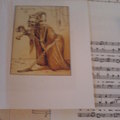XVII.
I do remember well where I should be,
And there I am.
Where is my Romeo?
What's here? Romeo, a cup, poison, I see,
The churl: drunk all, and left no friendly drop
To help me after.
I will kiss thy lips;
Thy lips are warm.
Az én jóságos szentatyám! És a férjem?
Emlékszem mit mondtál, hol ébredek majd
Itt vagyok, de hol van Romeo?
Csak menj, én el nem mozdulok.
Mi ez mit tart kezében kedvesem?
Hát méreg szegte életét derékba?
Fukar te! Nem hagytál egy árva cseppet,
Hogy utolérjelek? Hadd érem ajkad:
Talán maradt ott egy parányi méreg.
Mi porba sújt és mennyekbe repít.
Ajkad még meleg…
O Romeo, Romeo! wherefore art thou Romeo?
Deny thy father and refuse thy name;
Or, if thou wilt not, be but sworn my love,
And I'll no longer be a Capulet.
'Tis but thy name that is my enemy;
Thou art thyself, though not a Montague.
What's Montague? it is nor hand, nor foot,
Nor arm, nor face, nor any other part
Belonging to a man. O, be some other name!
What's in a name? that which we call a rose
By any other name would smell as sweet;
So Romeo would, were he not Romeo call'd,
Retain that dear perfection which he owes
Without that title. Romeo, doff thy name,
And for that name which is no part of thee
Take all myself.




